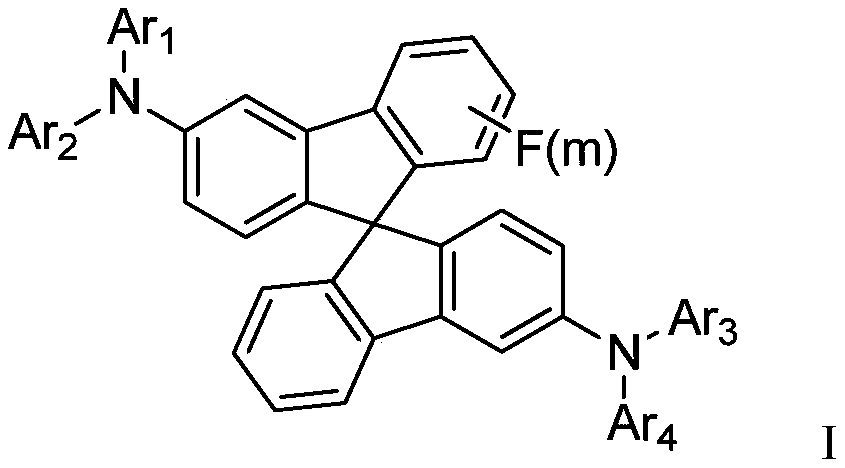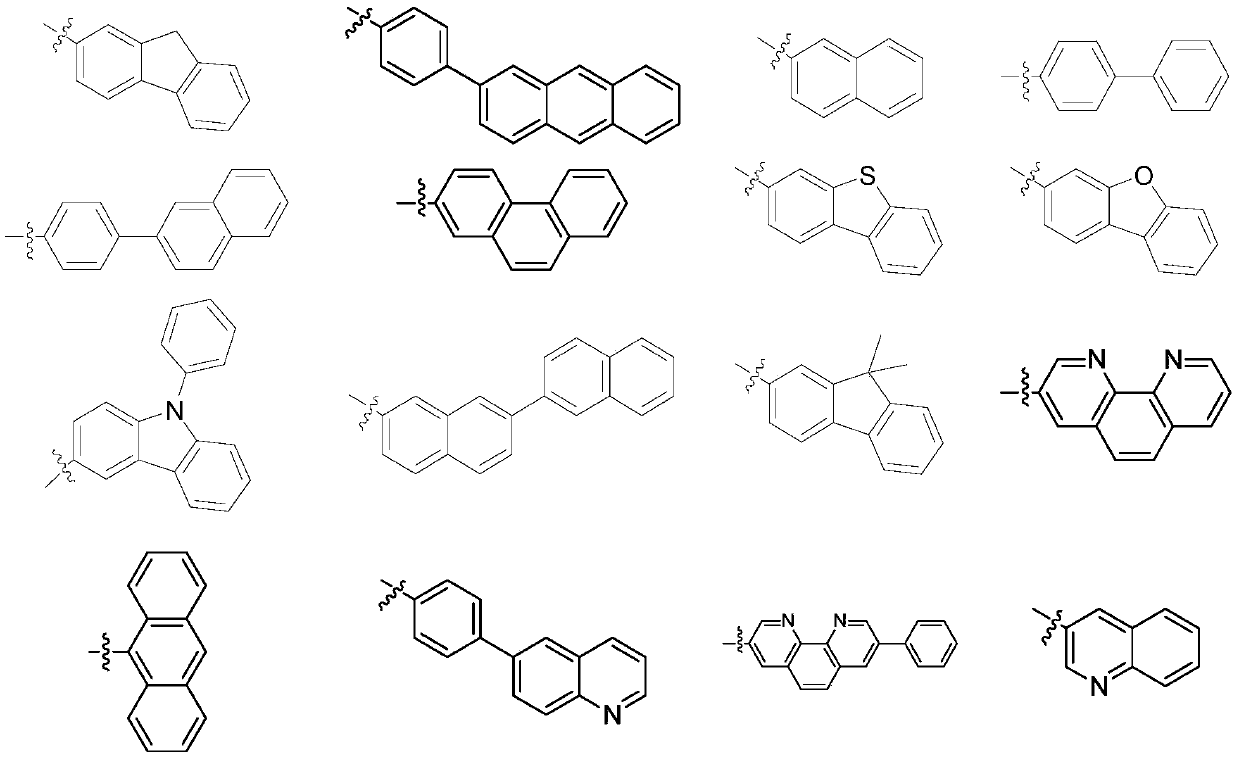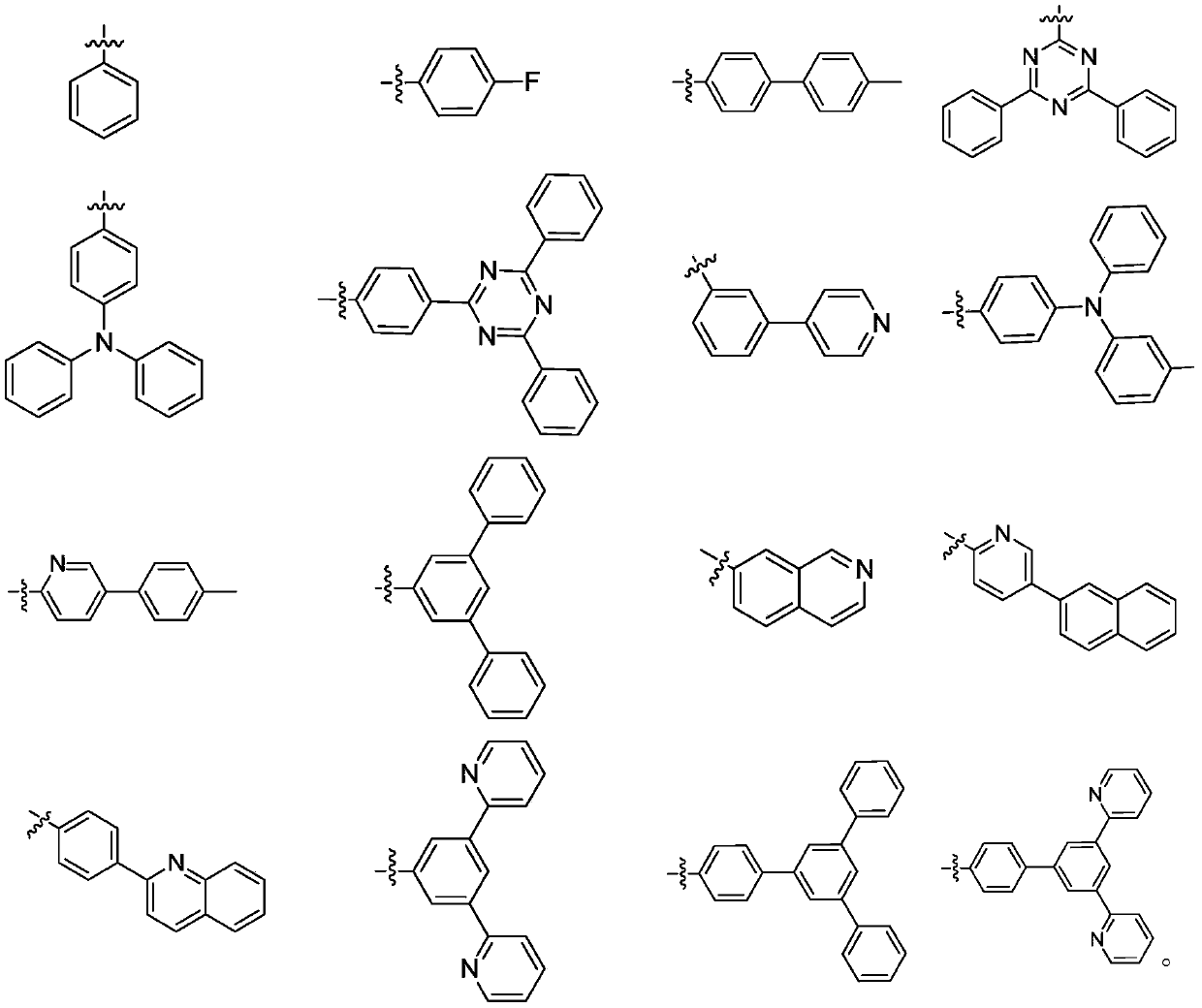Fluorine-containing hole material of spirobifluorene structure and preparation method and application thereof
A spirobifluorene and hole technology, applied in the field of organic electroluminescence display, can solve the problems of low glass transition temperature, easy crystallization of materials, and destruction of film uniformity
- Summary
- Abstract
- Description
- Claims
- Application Information
AI Technical Summary
Problems solved by technology
Method used
Image
Examples
Embodiment 1
[0071]
[0072] The synthetic route is as follows:
[0073]
[0074] Including the following specific steps:
[0075] Synthesis of compound B-23-2
[0076] 500 ml three-neck flask, equipped with magnetic stirring, after argon replacement, add 18.1 g (0.188 mol) of potassium tert-butoxide, N-([1,1'-biphenyl]-4-yl)-9H-fluoro-2- Amine 33.34g (purity 99%, 0.1mol) and toluene 100ml. After nitrogen replacement again, 1.6 ml of tri-tert-butylphosphine and 0.23 g of palladium acetate were successively added. After the addition was complete, the temperature was raised to 85°C. Start to drop a solution consisting of 49.22 g of fluorine-containing spirobifluorene dibromo-substituent compound (1-1) (purity 99%, 0.1 mol) and 100 ml of toluene, and control the temperature at 80-120°C. Cool down to 50°C, add 100m deionized water for hydrolysis, stir for 10 minutes, filter, and boil the filter cake several times with DMF, and rotary evaporate to obtain 64.67g white solid with a puri...
Embodiment 2
[0081]
[0082] The synthetic route is as follows:
[0083]
[0084] Including the following specific steps:
[0085] Synthesis of compound B-24-2
[0086] 500 ml three-necked flask equipped with magnetic stirring, after argon replacement, add 18.1 g (0.188 mol) of potassium tert-butoxide and 33.34 g (purity 99%, 0.1mol) and toluene 100ml. After nitrogen replacement again, 1.6 ml of tri-tert-butylphosphine and 0.23 g of palladium acetate were successively added. After the addition was complete, the temperature was raised to 85°C. Start to drop a solution consisting of 49.22g of fluorine-containing spirobifluorene dibromosubstituent compound (purity 99%, 0.1mol) and 100ml of toluene, and control the temperature at 80-120°C. Cool down to 50°C, add 100m deionized water for hydrolysis, stir for 10 minutes, filter, and boil the filter cake several times with DMF to obtain 65.52g of white solid with a purity of 99% and a yield of 88%.
[0087] Synthesis of compound I-24-2...
Embodiment 3
[0091]
[0092] The synthetic route is as follows:
[0093]
[0094] Including the following specific steps:
[0095] Synthesis of compound B-114-2
[0096] 500 ml three-necked flask, equipped with magnetic stirring, after argon replacement, add 18.1 g (0.188 mol) of potassium tert-butoxide and 35.14 g (purity 99%, 0.1mol) and toluene 100ml. After nitrogen replacement again, 1.6 ml of tri-tert-butylphosphine and 0.23 g of palladium acetate were successively added. After the addition was complete, the temperature was raised to 85°C. A solution consisting of 49.22 g of fluorine-containing spirobifluorene dibromosubstituents (purity 99%, 0.1 mol) and 100 ml of toluene was added dropwise, and the temperature was controlled at 80-120°C. Cool down to 50°C, add 100m deionized water for hydrolysis, stir for 10 minutes, filter, and boil the filter cake several times with DMF to obtain 69.02g of white solid with a purity of 99% and a yield of 90.5%.
[0097] Synthesis of comp...
PUM
 Login to View More
Login to View More Abstract
Description
Claims
Application Information
 Login to View More
Login to View More - R&D
- Intellectual Property
- Life Sciences
- Materials
- Tech Scout
- Unparalleled Data Quality
- Higher Quality Content
- 60% Fewer Hallucinations
Browse by: Latest US Patents, China's latest patents, Technical Efficacy Thesaurus, Application Domain, Technology Topic, Popular Technical Reports.
© 2025 PatSnap. All rights reserved.Legal|Privacy policy|Modern Slavery Act Transparency Statement|Sitemap|About US| Contact US: help@patsnap.com



